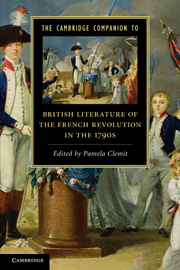Book contents
- Frontmatter
- 1 The Political Context
- 2 Burke, Reflections On The Revolution In France
- 3 Paine, rights Of Man
- 4 Burke And Paine: Contrasts
- 5 Wollstonecraft, vindications and historical And Moral View Of The French Revolution
- 6 Godwin, Political Justice
- 7 Wollstonecraft and Godwin: dialogues
- 8 Popular radical culture
- 9 Counter-revolutionary culture
- 10 Women’s voices
- 11 Novels of opinion
- 12 Revolutionary drama
- 13 Politics and poetry
- Guide to further reading
- Index
- The Cambridge Companions to...
5 - Wollstonecraft, vindications and historical And Moral View Of The French Revolution
Published online by Cambridge University Press: 28 July 2011
- Frontmatter
- 1 The Political Context
- 2 Burke, Reflections On The Revolution In France
- 3 Paine, rights Of Man
- 4 Burke And Paine: Contrasts
- 5 Wollstonecraft, vindications and historical And Moral View Of The French Revolution
- 6 Godwin, Political Justice
- 7 Wollstonecraft and Godwin: dialogues
- 8 Popular radical culture
- 9 Counter-revolutionary culture
- 10 Women’s voices
- 11 Novels of opinion
- 12 Revolutionary drama
- 13 Politics and poetry
- Guide to further reading
- Index
- The Cambridge Companions to...
Summary
In March 1794, when she was about to leave France, Mary Wollstonecraft wrote to her sister Everina: ‘I certainly am glad that I came to France, because I never could have had else a just opinion of the most extraordinary event that has ever been recorded’ (MW Letters, p. 249). In the five years between the outbreak of the Revolution in 1789 and her departure from France, the outlook and the politics of Mary Wollstonecraft, former governess, writer, reviewer and translator, were transformed by that ‘extraordinary event’. In her published responses to the French Revolution and to its British critics, she engaged with its philosophical context, underlying principles and, eventually, its social and political history. She is known above all as a feminist writer, yet her feminism was integrally connected to her emergence as a leading radical commentator on, and historian of, the French Revolution.
After a varied and unhappy early life, in 1784 at the age of twenty-five, Mary Wollstonecraft, with her sister Eliza, opened a school at Newington Green, just north of London, the home of one of the leading academies for English dissenters. There, although she herself remained formally within the Anglican church, she found a congenial circle of friends that included the dissenting minister, Richard Price, a campaigner for religious toleration and for the principles of the American Revolution. Influenced by Price and by Hannah Burgh, the widow of James Burgh, author of Political Disquisitions (1774, 1775), she learned something of the ‘commonwealth’ outlook on British politics.
- Type
- Chapter
- Information
- Publisher: Cambridge University PressPrint publication year: 2011



